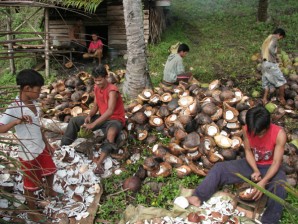LUCENA CITY—They might not have been physically abused but coconut farmers also suffered tortured lives under martial law.
To this day, on the 40th anniversary of the declaration of martial law, the farmers are still seeking justice, attempting to recover funds forcibly exacted from them during the dictatorial rule of the late Ferdinand Marcos.
“Martial law robbed millions of coconut farmers of the fruits of their labor. Ironically, the great injustice committed during martial law has yet to be rectified by the state. The coconut farmer victims, most of them now old and dying, continue to suffer,” said Oscar Santos, leader of a coalition of farmers groups.
Santos, a former Quezon congressman and administrator of the Philippine Coconut Authority during the term of President Corazon Aquino, has been on the forefront of an effort by reform-minded activists to recover billions of pesos in coconut levy imposed during the martial law years allegedly stolen by Marcos cronies.
The 84-year-old Santos said Filipinos should not forget that martial law did not only result in the rape of Philippine democracy and the violent deaths of thousands of freedom fighters but it also impoverished a quarter of the country’s population dependent on the coconut industry.
On Friday, some 3,000 coconut farmers from Quezon province, including children, joined thousands of anti-Marcos activists in Manila in remembering the dark days of the dictatorship.
The farmers also submitted a letter to the Supreme Court urging its committee on ethics and ethical standards to investigate the high tribunal’s “questionable” April 12, 2011, ruling declaring that the 20-percent shareholding in San Miguel Corp. (SMC) of businessman Eduardo “Danding” Cojuangco was not ill-gotten.
On Thursday, the Catholic Bishops’ Conference of the Philippines-National Secretariat for Social Action (CBCP-Nassa) sent a similar letter to the high court. It was signed by
Fr. Edwin Garriguez, the group’s executive director.
Cojuangco case
Marco Sardillo III, a volunteer lawyer for the farmers, said the court’s ethics committee was set up under its internal rules in 2010, to investigate all complaints alleging graft and corruption and other violations of ethical standards against members of the Supreme Court.
He said favorable action by the high tribunal on the letters could justify a reopening of the Cojuangco case, which had become final.
“If the committee finds that gross ignorance of the law marred the rendition of that judgment in favor of Mr. Cojuangco, as complained of by CBCP-Nassa and the farmers, then that could very well serve as a justifiable reason to revisit the ruling, in the name of fairness, equity and social justice,” Sardillo said.
Cojuangco, President Benigno Aquino’s uncle, holds at least P85 billion worth of shares that the farmers claimed were bought with coco levy funds.
The coconut levy was a tax exacted from coconut farmers from 1973 to 1982, during Marcos’ martial law regime, supposedly to develop the coconut
industry.
The collected levy was used by Cojuangco, a known Marcos crony, to acquire shares of stock in food and beverage giant SMC. After the ouster of Marcos in 1986, the SMC shares were sequestered.
Social justice
Following lengthy litigation, the Supreme Court ruled last year upholding Cojuangco’s claim that the 20 percent block of SMC shares belonged to him legally.
The ownership of another block comprising 24 percent of sequestered SMC shares of stocks is awaiting final resolution after the Philippine Coconut Producers Federation appealed the court’s ruling last January declaring that the shares belong to the government to be used for the benefit of the farmers.
The entire package of SMC shares was acquired while Cojuangco was president of state-owned United Coconut Planters’ Bank. Then valued at P2 billion, it is now estimated to be worth P200 billion.
Quezon farmers, believed to be the biggest contributor to the coconut levy fund, are claiming ownership of all shares held by the government and by Cojuangco on behalf of all coconut farmers in the country.
“With God on our side, we will once more appeal to the Supreme Court justices that in the interest of justice and fairness, they have to correct their decision that deprives the coconut farmers of their inherent and legal rights to the coco levy fund,” Bishop Buenaventura Famadico said.
‘All children of God’
The head of the Catholic diocese of Gumaca talked about the levy as a social justice issue in his homily during the Mass for the farmers held at Perez Park here before they left for Manila on Tuesday for a series of protest actions to focus attention on their campaign.
Famadico called on the peasants to pray and ask for God’s help to enlighten the justices who ruled on the coco levy case in Cojuangco’s favor in its controversial decision.
“Sharing God’s blessing should not be concentrated on the influential few. We’re all children of God,” the bishop said.
Pedro Montilla, 60, a farmer from Bondoc Peninsula, recalled how his late father collected and hid the levy receipts and certificates every time he sold copra.
“He kept on telling us until before he died several years ago that we have to wait because there is money in these papers,” said Montilla, who attended the Mass with his wife and two grandsons, aged 12 and 10.
“This battle for the return of the coconut levy fund is one struggle that we all have to face. If I die without seeing justice, my children and their children will continue the battle,” Montilla said.
The protests in Manila last week were organized by the Coalition of Coconut Farmers of Quezon (Coco-Farm-Quezon). In November last year, more than 100 Quezon farmers went on a 160-kilometer march on Manila to dramatize their demand for the return of the levy funds that they said were stolen from them.
